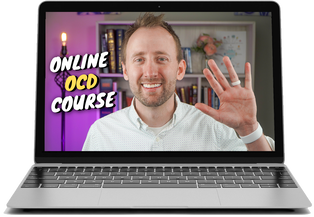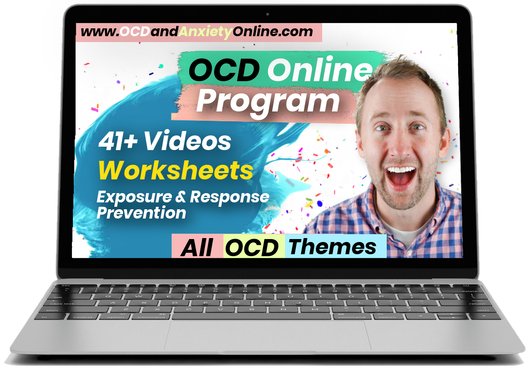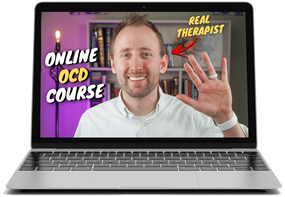How long does OCD recovery take?Isn't this the question we have with anything we want to go away in our life? How long will I have this? This question can cause a lot of anxiety to think about and bring a lot of comfort. It all depends on what mindset you have. To jump right into it, recovering from OCD depends on many factors. Do I have the right tools and am using the right treatment? Am I actually using the treatment often? Do I have a strong foundation for therapy? For many, treatment can be relatively quick. Individuals can feel better sooner, while others it may take longer. It also depends on the severity of symptoms. It's already infiltrated itself into your day, we might as well do something with it. I almost hesitate to give a specific number because I do not want you to be your timeline because your timeline is YOURS. Here is what I've heard many specialists suggest their own research. Many can expect to feel recovered between 12-20 therapy sessions and can see a clinically significant decrease in OCD symptoms. Others give a timeline of 2 months. Personally in my own practice, I've seen individuals for a few weeks and others a couple of years. There is not that magical formula that fits each person, but I'll share with you what I see as a standard for individuals getting better quicker. -Using exposure and response prevention the correct way. -Building an exposure hierarchy to help you face your fears in a gradual way -Doing these exposures daily and when I mean daily I don't mean 1x a day. I mean, making it your part-time job. It could be hours. -Simply put. You've got to stop doing compulsions. Even if you're feeling anxiety. -Your focus must be on recovery. It needs to take priority. -You must accept the anxiety, fears, doubt, and guilt and decide they bring no more value into your life. You can't be wishy-washy. "I'll accept this fear, but have to figure out this one." All these things are taught in my online OCD course. I'll link it here. You can even try it for free. Ultimately, who's going to get better quicker. The person who knows the tools and will do them every once in a while or the person who's dedicated themselves to recovery. They recognize the pitfalls, where they can improve and use resources around them. I do want you to know that you can recover from OCD. Things can get better. I also want you to have realistic expectations of what "recovery" means. For some, it may mean they are feeling minimal symptoms. For others, they've reduced symptoms up to 60% and are okay with that. Others may not feel symptoms for weeks, months, years. But here's the deal, this doesn't happen by doing treatment for a few months and then be golden for years to come. It's something you work on to maintain the progress that you've made. So when you hear others say online, "I am recovered" keep this in mind. Here is the most important thing. Your recovery is your own. Your timeline is your own. If you do get caught up in, "how long will this take" you may give yourself an answer like, "it takes as long as it takes and I've accepted this." I want you to get on top of this, you need to go right now watch the 25 tips for succeeding in your own OCD here. Thanks so much for watching and I'll see you next time. How to recover from OCDRecovery from OCD
0 Comments
OCD about the pastThink about your OCD and anxiety symptoms for a moment. Whenever you are feeling anxious or are ruminating. Is it about things that are happening right now in this moment? Typically we are feeling anxious about things from our past or things in our future. Really think about it. A thought like, did I leave the stove on? That lives in the past. Will I do this thing my brain says I’m going to do? This is in the future. So, real anxiety that is meant to be felt is for the present moment. Meaning, we need to see the threat. It can’t be a guess of what the threat is going to be it has to be something we actually can see right now. Something like that car that is coming my direction and I need to jump out of the way. I am at somebody’s house and I threw up. My child fell in the swimming pool and they can swim. Here’s the thing. When real moments of anxiety actually happen we can fix it and problem solve it. OCD and anxiety hate living in the present moment. Because in the present moment it knows there is not an actual threat. The only power it has is to warn you of a perceived threat even if it is so untrue and so unfounded. The only power thinks it has is to remind you of the past. To remind you of all those things that you did that you can’t believe you did. But the thing it forgets is that your brain back then is not the same brain you have now. Just like when you are five years old, the behaviors, the decisions you made, the tantrums you threw do not define who you are right now in this moment. Your brain is different now. We learn, we adapt, we look back at experiences and say wow, I can’t believe I actually did that. And the only way we got there is because we learned new things, we grew up. OCD loves to attach to the past. We give it zero attention. We don’t even need to use logic with it. Life is what it is. We learn through experiences and we move forward. When the brain comes up with memories from the past we can answer them with, oh yeah! I remember when that happened. Sweet glad I made those decisions. With these answers do they allow your brain to stop going to the past because you simply are teaching it that you don’t care. You’re not answering it the way that you normally would. When it comes to the future, we treated the same way. It comes up with any what if’s and we need to learn to answer it with yes, that may or may not happen. I don’t know, I don’t have a Time Machine to know for sure it is not my job to know right now. We will cross that bridge when I get there. Because more hours of ruminating and problem solving about possible threats does not prevent it from actually happening. Because we often find that there was no threat to begin with. Even when anxiety tells you so strongly that is true. We are not falling for it. So your job is to keep your anxiety and OCD symptoms in the present moment. Staying in the present means you’re not trying to problem solve future. Staying in the present moment means you are not revisiting the past. Staying in the present means you are actually being present. You’re going out and doing things even if you don’t feel up for it. You are allowing yourself to enjoy life and continually answering these past or future thoughts with uncertainty. So for you to gain the upper hand, we already know staying in the present moment is one of the best things you can do. Feel empowered when you do not engage in the past or the future. Allow life to be lived right now. Start by answering any threat with and maybe maybe not. This is how you will gain control over your OCD and anxiety. Here’s my question for you, let me know in the comments. Does your anxiety or OCD threaten you about the past or your future? Thank you so much for watching, and I will see you next time. OCD about the futureOCD about the presentExposure Therapy For OCDWhen somebody is facing their fear, they repeat this process over and over again their body tends used to it. We’ve seen this in many different ways such as jumping into a really cool swimming pool. At the very beginning it is very cold but their body adapts and get used to it. We didn’t have to spend time convincing ourselves it was going to get better, it just happens. This can be seen when we are using exposure and response prevention. When you are exposing yourself to the upsetting fear it’s going to feel very difficult at the beginning. Overtime, you may face the same fear but notice that the anxiety level is a lot less. This is seen as the habituation model. That we essxentially are doing exposures to reduce your anxiety by half or more. You’re getting used to it, you’ve taken the value away from it. When it comes to the habituation model, it’s all about this anxiety reduction in your body adapting just like the swimming pool. We will often use us as a measure of success if you were doing exposures correctly. If you’re anxiety is reducing this is a good thing. There are definitely some drawbacks from using the habituation model. Anxiety is something that we want to take value away from as well. If we are focusing solely on anxiety and having us go up and down individuals can get stuck in paying attention to the anxiety and wondering if they are doing the exposure correctly or not. Let me start obsessing about the actual anxiety versus the actual fear. Many will start to question and wonder why they’re in anxiety is not reducing. Well evidence shows that the habituation model does work, individuals can you get stuck with these pitfalls often. This is why there is another approach to exposure and response prevention called inhibitory learning. While this is still being researched there is evidence that shows that this helps reduce OCD symptoms as well. The difference is not the actual exposure you were doing but rather the way you were approaching it. With the inhibitory learning model you are teaching your brain more than reducing anxiety. Exposures are all about what can your brain learned from this experience. It doesn’t matter if your anxiety reduces or not. It might not even matter if you have anxiety while you’re doing the exposure. The whole mindset is all about your brain learning something new. So if I was facing a fear that really caused some anxiety, the way I approach is designed is to face the fear, expose yourself to it and RESPOND differently to the fear. You sole focus is what am I teaching my brain by every movement, words I’m saying, what I’m thinking, how I’m behaving. If I avoid touching something because it’s contaminated, my brain learned that that thing is dangerous. If I touched it and acted like it wasn’t a big deal and didn’t do any compulsions, then my brain learns it’s not a big deal. You may learn time and time again that you faced your fear and NOTHING happened. That is what the brain is learning. If you’re confused by the two, here is an easy way to remember: The habitual model means your body is getting used to it and your anxiety is reducing. Inhibitory learning model means your mindset is all about what your brain is learning from the exposure regardless of the anxiety felt. Realistically, there isn’t the right choice comes to do an exposures. You do what you feel like is best for you. I have used both models together where I focus majority of my time making sure that the person knows that the brain is learning something. We use anxiety as a measure but ultimately it doesn’t matter if the anxiety reduces or not. If your brain can learn that the fear that you have is not happening and it is it because you’re trying to control the situation what is the compulsions and to me that’s one of the best ways to do an exposure. Let things be. Stop controlling. It feels like an experiment, but the experiment is worth taking for your brain to learn something major. That you’ve never been a danger. Inhibitory Learning For OCDHabituation For OCDMy OCD Feels UniqueYou are not special! WAIT! Don’t don’t run away! I needed to get your attention for a moment. If you leave now you think I’m just a big jerk. Here’s what I mean by this!
So here is what I mean by you not been special. First of all your special. You matter in your feelings matter. Because you’re even watching this video right now it shows a lot of strength. So what I’m really meaning is that the OCD that you are experiencing is not different. Individuals can often think that the topic or theme that they are going through this special, it’s different, no one understands exactly what they are going through, its untreatable, I hear all these videos online I see all this advice but it doesn’t apply to my theme. Errrrrr! Nope! Your OCD is not special or different. This to me is one of OCD’s biggest lies. If it can make you believe that you are untreatable and that you are different from what you are experiencing then it’s got you. Individuals will often tell me that exposures they hear the specific theme just don’t apply to them. That if people really knew all the details of everything there experiencing they would change the treatment. So this is something that is important to note, something to tell your OCD even if you think it is different than everyone else’s to remind yourself that OCD is OCD. That follows the same route as everybody else. It’s making you doubt in question yourself and who you are as a person. It’s making you question the threats in the future and if they can come true or not. It’s giving you an intrusive thought putting a lot of meeting on this thought making you feel anxious that’s wanting you to do something to fix it. Simple as that. When we see OCD simply becomes simple. If you see OCD is complicated, different, or special, than it has the upper hand. To take control is to see it simply. Do not see yourself as different or special. Like I said you as a person are unique and special. Your OCD does not get to join this party. So as you’re seeing the videos that I have, your hearing advice given, and you think it doesn’t apply to your theme. Remember that this is a lie. Give yourself more credit. You can even remind your OCD that it’s not special when it’s trying to take the light. Give yourself the opportunity to do treatment. I know what people say, “but if you only heard what I’m going through you’d be shocked. You would say that mine is different.” Don’t even allow your brain to go there. Instead he focus on living life and enjoying. This tactic the OCDs using is no longer going to be something you fall for. Treatment is available if you’re looking for a specialist. So here’s my question for you, have you ever felt that your OCD is different than everyone else’s? How To Stop Ruminatingmination is essentially trying to problem solve the perceived threat or fear. It’s not as easy to just say, “stop ruminating”, so here are some tips for you when you feel like you’re stuck in the OCD rumination.
Life AFTER OCD | What does it look likeWe often talk about what to do when you're having OCD symptoms. But, what does it look AFTER you go through treatment? Do you stop treatment? Are you cured? Let's go through this so you can have a good perspective of what "recovery" looks like. How To Be Successful With OCD TreatmentIf you're working through exposure and response prevention; these 25 tips are GOLDEN. Originally presented by Fred Penzel, Ph.D. of Western Suffolk Psychological Services. Dr. Penzel gave me special permission to present his 25 tips to you. 🖐🖐Check out my ONLINE self-directed program for OCD🖐🖐 👉👉 https://www.OCDandAnxietyOnline.com 👈👈 25 Tips for Succeeding in Your OCD TreatmentHow to maintain progress OCDHow To Stop A Panic AttackDo you know what to do during a panic attack? Did you know there is treatment? It might look different than you’ve expected. Panic attacks can happen at any time and can often be mingled with stress, anxiety, or OCD. Let’s go through Panic Attacks, why you have them, and what to do with them. What to do during a panic attackTreatment for panic attacksWhat is Sensorimotor OCD?Sensorimotor OCD, like many other types of OCD, can be complicated, confusing, and debilitating. Imagine if you noticed every heartbeat you had, every breath, or every time you blinked. I don't mean just noticing it; I mean, it is forced into your awareness ALL DAY. Could you hold a conversation, could you watch tv, could you go to work? These are all scenarios individuals may struggle in when they suffer from this type of OCD. Let's go through what sensorimotor OCD is and what the treatment looks like. Sensorimotor OCD TreatmentTreatment For Sensorimotor OCD |
AuthorNathan Peterson specializes in working with OCD and Anxiety related disorders and has done so for the past 7+ years. Archives
January 2023
Categories
All
|




 RSS Feed
RSS Feed